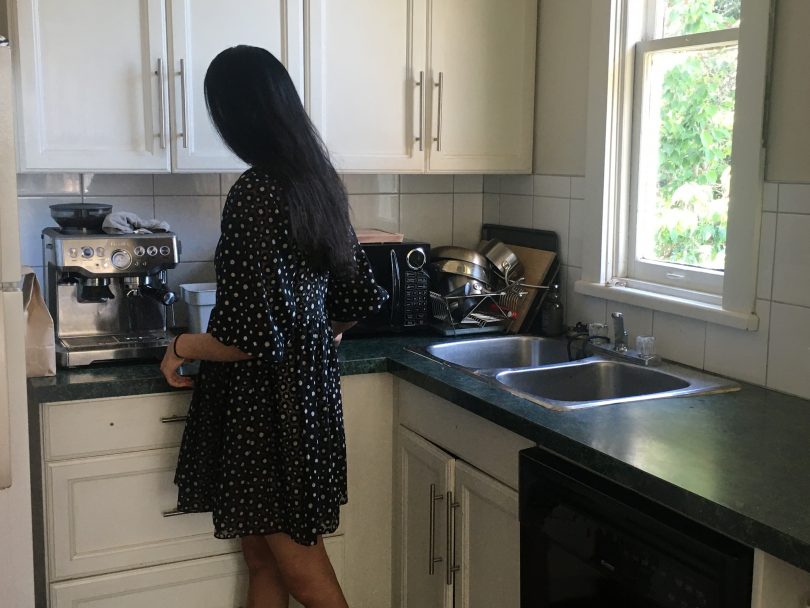It’s a bright Thursday afternoon, and I am standing in an inner-city McDonald’s parking lot in Victoria, the capital of British Columbia, Canada. I’m trying to look inconspicuous. I feel the darting eyes of a security guard on me. I was hoping he couldn’t foretell the crime that I was about to take part in. My accomplice waves me over. My goods rest on the top of his silver Mazda. We make small talk, I slide him $10 cash, and the deal is done.
Garlic cream sauce leaks from the brown paper bag. I’m having Lebanese fatteh for lunch. Eating things you buy from strangers on the Internet is a bad idea by most accounts, including the Canadian health authorities. The food is unchecked and unregulated. Selling from an unlicensed premise is illegal, but getting a license is arduous at best and impossible at worst. But despite this, a quick search on Facebook Marketplace brings us pages upon pages of pillowy sourdough loaves, crisp falafel wraps, and triangles of leaf-wrapped sticky rice.
Extensive job losses and restaurant closures during the COVID 19 pandemic have led more home chefs to start selling their wares online. While many vendors seem unphased by the potential dangers of their work, its grey-zone legal status puts their finances, passions, and community connections in a precarious position.

Fatteh is an Egyptian and Levantine dish that translates to “crumbs”. This one, from Marketplace, was made with potato, eggplant, and crisped pita. PIC: Kaya Martin
Christine, who didn’t want her last name mentioned for privacy reasons, has a Facebook ad titled “Pierogies… Potato, cottage, and cheddar cheese are all three ingredients in the pierogies together !!!.” I knock on her door, and a dog starts barking. Christine is a young Indigenous Canadian woman with a friendly but serious expression, wearing basketball shorts and a red hoodie.
She began selling pierogies to friends and family to fundraise for her 15-year-old daughter’s soccer trips. In 2022, the team has a tournament planned in the Dominican Republic. Christine cooks with her daughter each week, using her Ukrainian ex-boyfriend’s family recipe. As a single mother, Christine must hustle to provide for her family. She works full-time as a baker and has recently picked up another job delivering pizza on evenings and weekends.
Since starting her Facebook page just over a year ago, she has received two messages warning her she may be fined. They didn’t worry her much. She thinks charging her would be a waste of the government’s time. “If they want to come after me for this, why don’t they chase down my ex for child support instead?” she tells me.
Entrepreneurship runs in the family — Christine’s nephew’s wife runs a website selling gourmet cakes. When sales grew, they decided to bring the business above the ground. But her relative was luckier than most. She owns her home, which has a detached kitchen in the basement suite that she was able to get certified as a bakery.
“I’m a renter — it’s not my house,” Christine tells me. “I could never get it legalized.” She suggests that I boil, then fry the pierogies with extra butter. They are fluffy and tangy, the perfect comfort food. She definitely didn’t skimp on the cheese — the insides have the bright orange hue of Canadian cheddar.
The regulations on the sale of home cooking in British Columbia are both harsh and ambiguous. The province’s Public Health Act requires that kitchens be “separate from and without direct access to living quarters” to be eligible for a permit. This disqualifies many home kitchens which, by nature, tend to be attached to the home. Those with guest houses or abnormal floor plans may meet the criteria, although this is not typically the case for low-income families.
To get around the permitting rules, entrepreneurs have the option of cooking at an approved community centre or public hall. But for chefs, this process can be restrictive, time-consuming, and expensive. “Whenever Island Health receives a complaint or becomes aware of someone producing food for public consumption in an unapproved location, our Environmental Health Officers follow up to work with individuals to achieve compliance with all regulations,” said a statement by the Island Health, the government body that handles food safety in the Canadian state of Victoria.
However, little seems to be done about those who break the rules. Karen Williams has been selling on Facebook for over two years. Her husband is Moroccan. She taught herself to cook meals from his home country. I visit her house to pick up two orders of rfissa, a chicken and lentil dish traditionally served to celebrate the birth of a child. As we chat in the doorway, her daughter peeks at me from behind her leg.
Last January, on her birthday, Williams received a call from the Environmental Health Officer telling her to desist. She believes the report came after a customer wrote a supportive Facebook post that included a photo of her business card and personal information. She stopped the business – for a while. She was frightened. But a month later, she was forced to start up again. She needed the money.
“This was paying our rent,” she tells me. Since then, she has not heard from the Environmental Health Officer. “It’s not like I’m forcing people to order from me,” says Williams. “If they send someone to knock on my door, maybe then I’ll stop.” She told me she would gladly get a permit if she could, but her home doesn’t meet the requirements. After working in restaurants for over 15 years, she is sceptical about the efficacy of the current system. “Just because a guy with a clipboard walks through every six months, it doesn’t mean it’s clean,” she tells me. “I feed my family here.”
Her rfissa is tender, savoury, and seasoned to perfection. As it stands, there are no Moroccan restaurants in Victoria. Williams dreams of opening the first. She tells me a lot of her customers are immigrants looking for a taste of home.

Rfissa is a traditional Berber dish that is served after childbirth. Among other things, it contains fenugreek seeds that are known to have post-natal medicinal benefits. PIC: Kaya Martin
Other Facebook Marketplace chefs also aspire to start more legitimate businesses. Roshini Afzal sells south Indian grilled chicken combos with hummus, mint chutney, salad and pita. She hopes to one day run a food truck. As we talk, I find it hard to focus. I’m hungry, and the fragrance of chilli-spiced ghee and charred chicken skin is intoxicating.
Afzal started selling two months ago when a wrist injury forced her to leave her food service job at the hospital. She has FoodSafe Level 2 certification, a requirement for anyone in the restaurant industry, and also works at a Burger King. Her husband suggested she sell her cooking online to keep herself busy. At first, she was hesitant, but when she saw how many ads there were for food on Facebook, she decided to try it. “I was scared,” she tells me, “but I asked somebody, and they said it was fine. We can sell anything on Marketplace.”
Now Afzal fulfils 20 to 50 orders a week. Her meals are only $10 (Canadian dollar), but she said she would sell them for less if ingredients were cheaper. She loves to feed people. “There are a lot of people who want to work from home. They have babies, they can’t go out and work,” she says. “We already cook, so we can cook for others.” Even though she is fasting for Ramadan, she was happy to make my meal.“You’re my first white customer,” she tells me with a giggle.
Dr Annalee Lepp, Professor of Food, Gender and Power at the University of Victoria, tells me she understands why most chefs on Marketplace seem to be stay-at-home moms and women from ethnic backgrounds. “I think for marginalized communities in particular — or immigrant communities, ethnic communities, racialized communities — there is a way in which food is oftentimes a link to the origin point,” Dr Lepp tells me.
She says that sharing food is a way to bring people together. “When you’ve lost your job, or you’re experiencing financial hard times, you rely on the skills that you have.” Dr Lepp told me, “food is an area where I truly believe that we could maybe relax the regulations. But that said, I would hate to see someone – if something would happen, that they would be liable in a really significant way, and I think that’s what the regulations are trying to get at.”

Roshini’s chicken combos only cost $10, but she says she would sell them for less if ingredients were cheaper. She “loves to feed people”. PIC: Kaya Martin
One thing I have learned from my journey into the “dining underworld” is that food, despite the rise of sites like Google Reviews and TripAdvisor, is not a meritocracy. Owning a proper restaurant is a luxury. It’s just not available to those without the funds, or without documented immigration status, or with kids that need to be dropped off and picked up from daycare.
But what is the point of a kitchen if not to be cooked in? And what is the point of food if not to be shared? As it stands, the regulations in British Columbia outlaw the Syrian refugee making pastries, the samosa delivery lady, and even the Mormons who offer free cookies with a message from Jesus Christ. Of course, their crimes are unlikely to be prosecuted. But if someone decided to report them, there’s a chance they could be.
Earlier this year, the Canadian province of Ontario relaxed their rules on home kitchens. Now, chefs can sell “low risk” items such as baked goods, candies, and jams. They still must adhere to the Food Premise Regulations and Health Protection and Promotion Act requirements. Periodically, a health officer may come through for an inspection. This gives them a reason to ensure their food is safe, and if so, it protects them from a sudden shutdown. I’m sure many British Columbian home chefs and foodies are crossing their fingers that we follow suit. Until then, I’ll be scrolling through Marketplace, licking my lips, and taking my chances.





